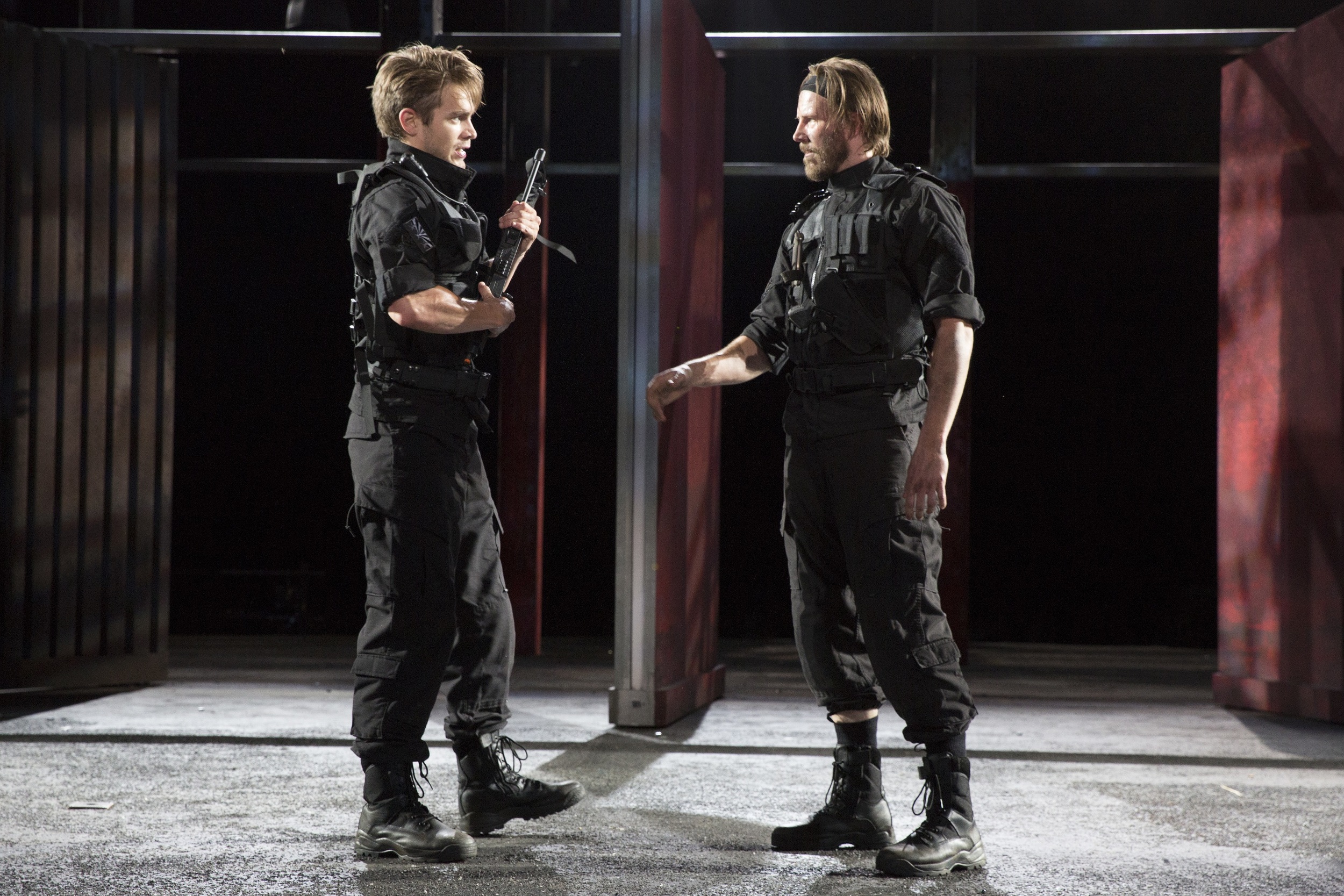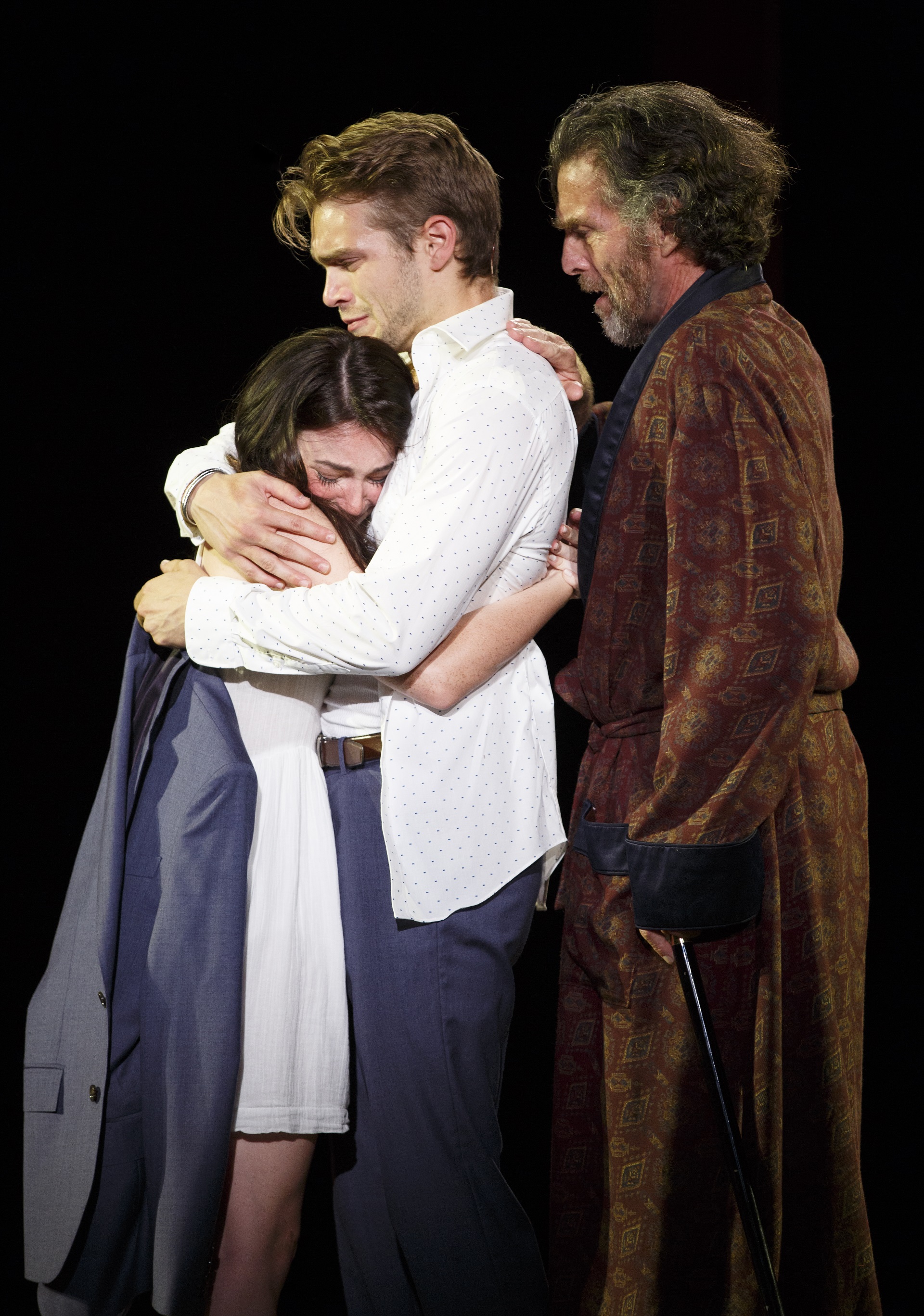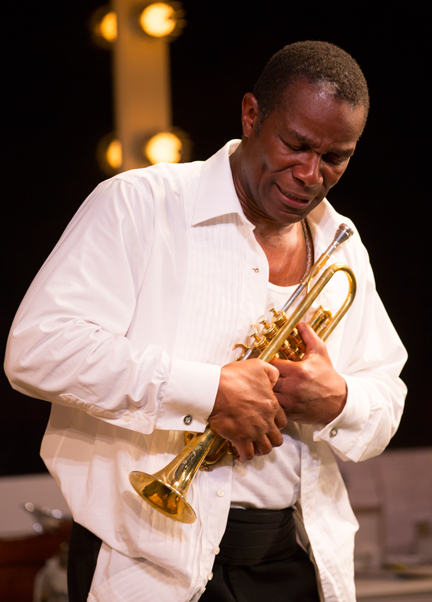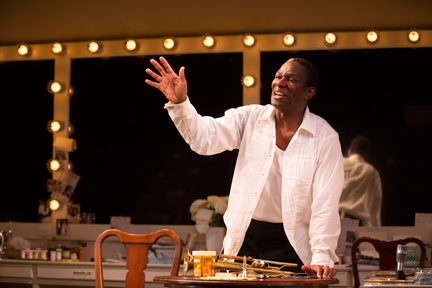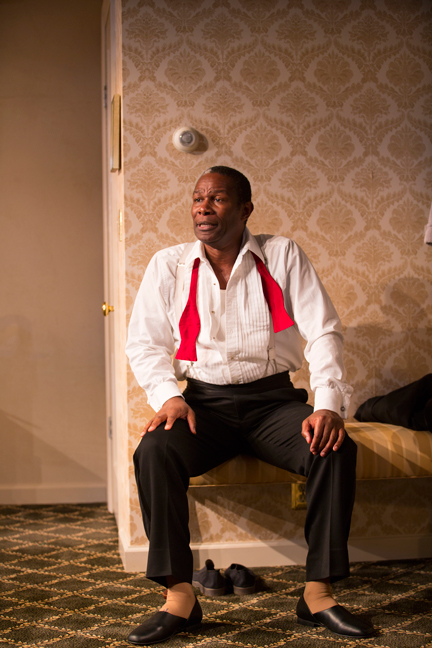Review of Troilus and Cressida, The Public, Free Shakespeare in the Park
There’s testosterone aplenty in The Public’s very successful Troilus and Cressida, directed by Daniel Sullivan with a keen sense of how to make the play timely while keeping its tone, rather quizzical and scurrilous for a tragedy, intact.
Mind you, you’d expect much manliness in a play about the siege of Troy at the hands of the Greeks, as Shakespeare revisits the ground so well developed by Homer. Here, it’s not about taking sides and we’re very much aware—how could we not be?—how self-serving reasons for invading another country or kingdom might be, and how ill-conceived. From the outset, war is for the purpose of vanquishing one’s enemies; any other settlement means giving up on the collective fantasy of victory. More to the point, and the play brings this out abundantly, none of the combatants are fighting precisely for the same thing or with the same will. And much of the drama here concerns things soldiers get up to when not engaged in battle, and plotting and partying and looking for an advantage in status is very much the business at hand.
We all know the basic set-up, but where the Iliad centers on Achilles and Agamemnon’s stand-off over a slave-girl, Shakespeare’s play takes up a love affair on the Trojan side fated to fare badly due to war and its obligations. In other words, a love interest and, importantly, jealousy, infuses all the talk of valor and honor and kills and conquests. Troilus (Andrew Burnap), a Trojan, is emphatically his own man, and that’s important since he’s apt to be further down on a list of famed heroes that includes his brothers Hector (Bill Heck) and Paris (Maurice Jones), and warrior Aeneas (Sanjit de Silva), and, on the Greek side, Achilles (Louis Cancelmi), Agamemnon (John Douglas Thompson), Ulysses (Corey Stoll), Nestor (Edward James Hyland) and Menelaus (Forrest Malloy). Burnap has romantic-lead good-looks, can play passion well, and makes Troilus’s story—which isn’t so central as you might expect—matter to us. He’s a human hero among a bunch of guys who seem to believe their own Homeric PR.
Brothers-in-arms: Troilus (Andrew Burnap), Hector (Bill Heck)
All the many characters here are in supporting roles, which means ensemble play is key, and also that the show is an embarrassment of riches in actors playing somewhat minor important roles, such as John Douglas Thompson as Agamemnon, a part that mainly requires being stuffy and, eventually, a bit drunk. As Ulysses, who is key to much of the plot, Corey Stoll plays it shrewd and aloof, except when the commander’s will to power gets the better of him and he gets worked up. He stalks about in a civilian suit with combat boots and makes us generally uneasy the way any sighting of Dick Cheney always did, back in the lamented reign of W. et al. He’s not above any skullduggery to get things to go as he would like. Along the way, nobler souls will fall—the play might be considered more properly the tragedy of the duty-bound Trojan hero Hector, but for the fact that we feel his fate is so—well—fated.
A key role well-cast is John Glover as Pandarus, the character here who, somewhat comparable to Shylock in Merchant, is both a figure of fun and a figure of surprising pathos. His every effort is to bring together Troilus and his niece, Cressida (Ismenia Mendes), and they do get a wonderfully entertaining courtship scene that Mendes plays with beguiling grace in a very self-aware and contemporary manner. But Pandarus’ thanks is to see it all go to hell because such satisfactions mean nothing in the time of war. Leaning heavily on a cane in his white flannels, Glover’s Pandarus lights up the stage with the tones of a jaded bon vivante, a man entirely out of step with the times. He gets the first and last lines of a play he frames, his hopes turned to rancor.
War-tossed lovers: Cressida (Ismenia Mendes), Troilus (Andrew Burnap) with Pandarus (John Glover)
Other very capable turns include Edward James Hyland’s diplomatic Nestor, Nneka Okafor’s distraught Cassandra, and Zach Appelman strutting his fit form as Diomedes, Troilus’s Greek rival. The scene where Cressida sort of cleaves to Diomedes is fraught with a prowling alley cat ambience that makes the level of arousal very high indeed. It’s a key moment where feminine agency within the stories men tell is seen for what it is: a strategy. Tactics are very much the lesson of the day in this play, and this seduction scene, witnessed by Troilus and Ulysses, is among the best touches Sullivan sets up for us, along with Ulysses as an assassin, and those assault rifles and explosions realistically loud and jarring.
Court gossip: foreground: Paris (Maurice Jones), Helen (Tala Ashe), Pandarus (John Glover)
As Paris and Helen, the other couple we might expect to offer some interest, Maurice Jones plays Paris as princely and rather lacking in soldierly demeanor, while Tala Ashe’s Helen, wineglass in hand, is a treat in her brief scene. Never was the status of trophy mistress more apt to a heroine’s condition, and Helen seems bored by the fatal hullabaloo these heroes are sustaining in her name. It’s as if a personification of “freedom” had to step onto the stage during the Iraq invasion.
Man in the Gap: Ajax (Alex Breaux), Ulysses (Corey Stoll), Diomedes (Zach Appelman), Nestor (Edward James Hyland)
As Ajax, the proud dullard who wants to prove himself, Alex Breaux gets some of the best laughs, at least those that don’t come by way of Max Casella’s Thersites, who seems to have dropped in from one of the boroughs to add a jaundiced touch of hero-puncturing. His irritation at his betters is the perfect foil for Louis Cancelmi’s Achilles, a shrewd sort of lout who knows his worth and cares little for what others think or say; his playfellow Patroclus—Tom Pecinka, a feckless boy-toy—gets some flak for distracting the Greek hero from the battlefield, but at the end of the day it’s Achilles’ lack of interest in the cause that makes him mope. His eventual showdown with Hector undermines the Greeks’ hero to such an extent it’s as if viewed through the eyes of a Trojan news report.
A rogue's war: Thersites (Max Casella)
David Zinn‘s inventive and intriguing set serves well, adapting to the very different spaces quickly, and opening up for action sequences, but also containing enclosed spaces for Achilles’ barracks and for Cressida’s residence among the Greeks. There’s furniture to fling about and manly props and fight sequences, and interesting choices—again by Zinn—of modern costuming.
Sullivan’s cast does justice to the play’s changing focus without letting any segment overstay its welcome. Most importantly, this Troilus and Cressida reveals the play to be Shakespeare at his most proto-modern in eschewing grand tragedy for situations in which characters stick to the roles expected of them and how things turn out has to do with the shifts in emphasis among a collective. There’s no “all for one, one for all,” in this war, and yet the dedication to carnage and the acceptance of wasted life seems to be the price of admission for the kinds of heroics Shakespeare and Sullivan are subtly skewering. So seldom done and here done so well, The Public's Troilus and Cressida should be seen and celebrated.
Troilus and Cressida
By William Shakespeare
Directed by Daniel Sullivan
Scenic and Costume Design: David Zinn; Lighting Design: Robert Wierzel; Sound Design: Mark Menard; Hair and Makeup Design: Cookie Jordan; Original Music: Dan Moses Schreier; Co-Fight Directors: Micheal Rossmy and Rick Sordelet; Voice Coach: Alithea Phillips; Production Stage Manager: James Latus; Photos: Joan Marcus
Cast: Zach Appelman, Tala Ashe, Connor Bond, Alex Breaux, Andrew Burnap, Louis Cancelmi, Max Casella, Andrew Chaffee, Michael Bradley Cohen, Sanjit de Silva, Paul Deo Jr., John Glover, Jin Ha, Bill Heck, Hunter Hoffman, Nicholas Hoge, Edward James Hyland, Keilyn Durrel Jones, Maurice Jones, Forrest Malloy, Ismenia Mendes, Nneka Okafor, Tom Pecinka, Kario Pereira-Bailey, Miguel Perez, Grace Rao, Corey Stoll, John Douglas Thompson
The Public Theater
Free Shakespeare in the Park
Delacorte Theater
July 19-August 14, 2016
